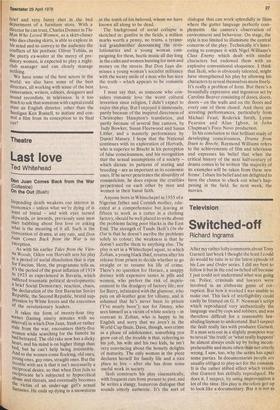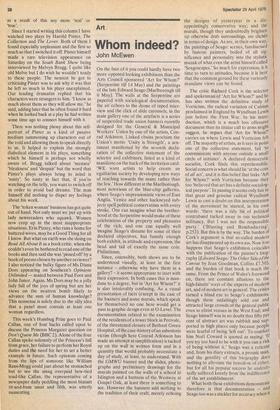Television
Switched-off
Richard Ingrams
After my rather lofty comments about Tony Garnett last tveek I thought the least I could do would be tune in to the latest episode of his Law and Order series. I did my best to follow it but in the end switched off because I just could not understand what was going on. Police, criminals and lawyers were involved in an elaborate game of corruption. But how it worked I was unable to make out. This lack of intelligibility could easily be blamed on G. F. Newman's script which reproduced very authentically the language used by cops and robbers, and was therefore difficult for a reasonably lawabiding layman to understand. But! suspect the fault really lies with producer Garnett. If a man sets out in a slightly pompous way to reveal the truth' or 'what really happens' he almost always ends up by being incomprehensible and more often than not utterly wrong. I saw, too, why the series has upset some parties. In documentaries people are usually obliged to play-act for the cameras. It is the rather stilted effect which results that Garnett has skilfully reproduced. He does it, I suspect, by using improvisation a lot of the time. His play is therefore got up to look like a documentary. But it is not as as a result of this any more 'real' or 'true'.
Since I started writing this column I have watched two plays by Harold Pinter, The Collection and The Lover. Both of them I found especially unpleasant and the first so much so that I switched it off. Pinter himself made a rare television appearance on Saturday on the South Bank Show being interviewed by Melvyn Bragg. I quite like old Melve but I do wish he wouldn't toady to these people. The nearest he got to criticising Pinter was to ask why it was that he left so much in his plays unexplained. Our leading dramatist replied that his characters were strangers to him. 'I know as much about them as they will allow me,' he said, adding later that he often found it hard when he looked back at a play he had written some time ago to connect himself with it.
There was nothing phony about this selfportrait of Pinter as a kind of passive medium summoning up characters out of the void and allowing them to speak directly to us. It helped to explain the strongly diabolical element in his plays, something which he himself is perhaps not wholly aware of. Bragg talked about 'menace' 'bleakness' and 'despair' but the word that Pinter's plays always bring to mind is 'nasty'. So nasty in fact that, if you're watching on the telly, you want to switch off in order to avoid bad dreams. The man himself did nothing to dispel my feelings about his work.
The 'token woman' business has got quite out of hand. Not only must we put up with lady newsreaders who squawk. Women now crop up in the most inappropriate situations. Erin Pizzey, who runs a home for battered wives, may be a Good Thing for all I know. But what on earth was she doing on Read All About It as a book critic, when she couldn't even be bothered to read one of the books and then said she was 'pissed off' by a book of poems chosen by another reviewer? I also noticed the bulky figure of Ms Diana Dors appearing on Southern's Opinions Unlimited — seated between Paul Foot and John Junor. Again, Ms Dors may be a jolly lady full of the joys of spring but are her views on the neutron bomb likely to advance the sum of human knowledge? This nonsense is solely due to the silly idea that a panel must contain at least one woman regardless.
This week's Humbug Prize goes to Paul Callan, one of four hacks called upon to discuss the Princess Margaret question on Don't Quote Me (BBC 2). Alone of the four Callan spoke solemnly of the Princess's fall from grace, her failure to perform her Royal duties and the need for her to set a better example in future. Such opinions coming from the lips of someone like William Rees-Mogg could just about be stomached but to see the smug overpaid bow-tied toad-like Callan, the representative of a newspaper daily peddling the most blatant tit-and-bum smut and filth, was utterly nauseating.



































 Previous page
Previous page